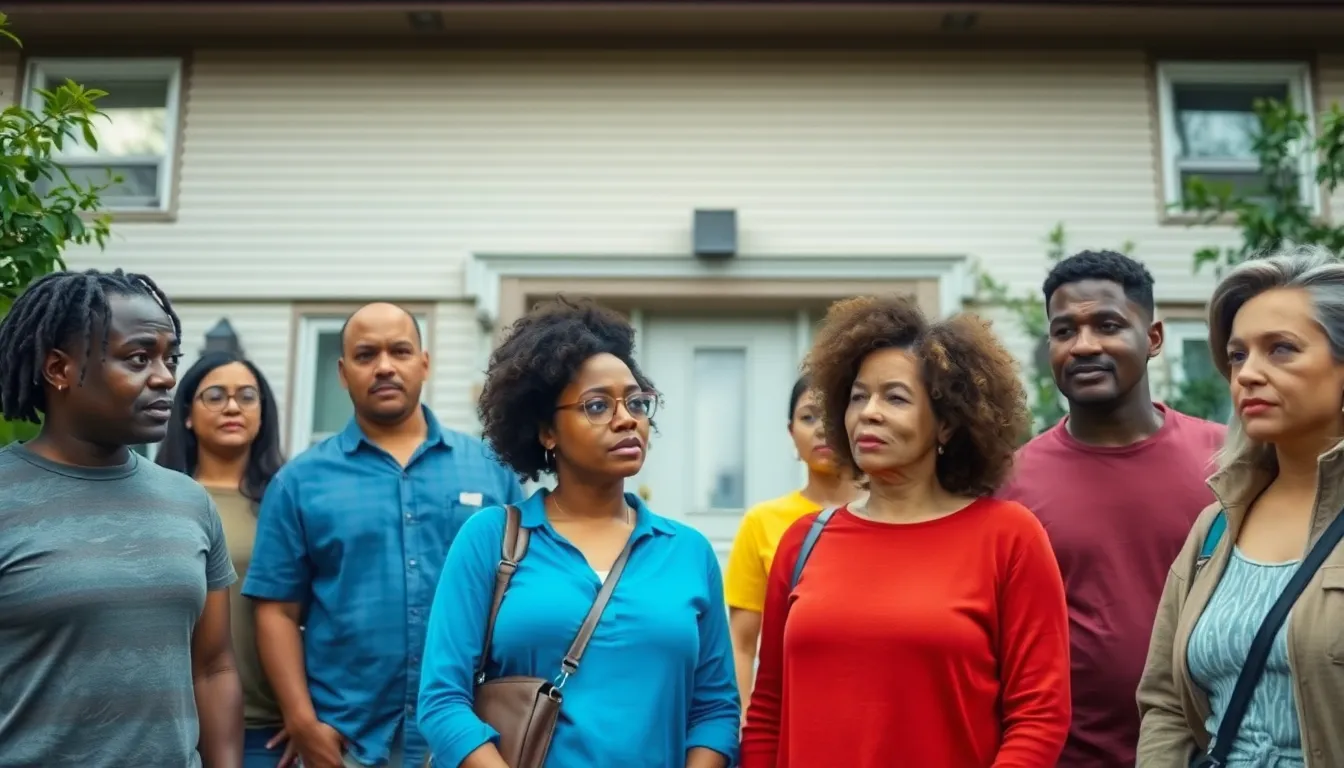Table of Contents
ToggleNavigating the rental world can feel like stepping into a game of Monopoly—complete with unexpected rent hikes and the occasional landlord that thinks “no pets” means “no fun.” Luckily, tenant legal protections exist to keep players in the game and ensure that renters aren’t just pawns on the board.
Understanding these protections isn’t just about knowing your rights; it’s about empowering yourself to create a living situation that feels like home. From security deposits to eviction notices, knowing the rules can save tenants from a whole lot of headaches. So grab your favorite beverage, kick back, and let’s dive into the world of tenant legal protections—because everyone deserves a safe and cozy place to call home, even if it doesn’t come with a “Get Out of Jail Free” card.
Overview of Tenant Legal Protections
Tenant legal protections encompass various laws designed to safeguard renters from unfair treatment by landlords. These protections vary by state but generally include the right to a safe and habitable living environment. Renters often face issues such as unauthorized eviction or unsafe conditions, which these protections aim to address.
Security deposits represent a common area of concern. Many states limit the amount landlords can charge, typically one to two months’ rent. Regulations also dictate how quickly landlords must return deposits after a tenant moves out, often within 30 days.
Eviction notices must adhere to specific legal procedures. Landlords usually need to provide a written notice detailing the reason for eviction and a timeframe for the tenant to remedy the situation. This timeframe typically ranges from 3 to 30 days, depending on the circumstances and state regulations.
Moreover, anti-discrimination laws serve as a crucial aspect of tenant protections. The Fair Housing Act prohibits discrimination based on race, color, religion, sex, national origin, familial status, and disability. Tenants can file complaints if they experience discrimination during the rental process.
Additionally, many jurisdictions offer rent control measures. These regulations limit how much landlords can increase rent annually, often capping increases at a specific percentage. Such measures aim to provide housing stability for tenants in rapidly growing markets.
Understanding these legal protections empowers tenants to advocate for themselves. Knowledge of rights regarding repairs, maintenance, and lease agreements fosters confidence in navigating the rental landscape. With a clear grasp of tenant protections, renters can create and maintain a comfortable living environment.
Importance of Tenant Legal Protections
Tenant legal protections play a crucial role in ensuring safe housing environments and fair treatment. By understanding these rights, renters can navigate the complexities of their leases more effectively.
Protection Against Unlawful Eviction
Protection against unlawful eviction safeguards tenants’ rights and ensures due process. Landlords must follow specific legal procedures before evicting a tenant, which include providing written notices and allowing time for resolution. Many states require landlords to prove valid reasons for eviction, such as lease violations or nonpayment of rent. Without adhering to these regulations, landlords compromise tenants’ security and stability. The awareness of these measures empowers renters and raises their confidence in handling disputes that may arise.
Security Deposit Regulations
Security deposit regulations protect tenants from potential abuses regarding their deposits. Most states limit deposits to one or two months’ rent, providing more predictability in their financial planning. Furthermore, laws dictate the timeframe for returning deposits after a tenant moves out, often requiring landlords to provide itemized deductions for any withheld amounts. Transparency in this process prevents misunderstandings and ensures that tenants are not unfairly penalized. Knowing these regulations helps renters advocate for themselves and maintain financial security during their tenancy.
Common Tenant Rights
Tenants possess several fundamental rights that ensure fair treatment and protect their well-being in rental situations. Understanding these rights equips renters with the knowledge to navigate potential issues effectively.
Right to Habitable Living Conditions
Every tenant deserves a safe and livable environment. Landlords must meet local health and safety codes, including providing essential services such as heat, water, and electricity. In addition, tenants can report hazardous conditions, like mold or pest infestations, ensuring timely repairs. When landlords fail to maintain these standards, tenants may have legal grounds to pursue remedial actions. These actions often include withholding rent until repairs are made or even terminating the lease agreement in severe cases.
Right to Privacy
Renters maintain the right to privacy within their homes. Landlords cannot enter a tenant’s unit without providing reasonable notice, typically 24 hours, unless there is an emergency. Unauthorized entry constitutes a breach of privacy and can result in legal repercussions for the landlord. Tenants can reasonably expect their personal space to remain undisturbed, allowing them to feel secure and comfortable in their living arrangements.
Resources for Tenants
Accessing resources can significantly aid tenants in understanding their rights. Local organizations and legal aid services offer critical support to navigate rental issues effectively.
Local Tenant Organizations
Local tenant organizations provide essential resources for renters. They often advocate for tenant rights and help individuals learn about local laws. Many organizations host workshops that cover housing stability and fair rental practices. Additionally, they can assist with filing complaints against landlords. Communities can find these organizations through public libraries or community centers. Engaging with these groups fosters a sense of solidarity among renters, enhancing their collective voice.
Legal Aid Services
Legal aid services offer free or low-cost legal assistance to qualified tenants. They provide consultations for individuals facing eviction or legal disputes with landlords. Many services specialize in issues like security deposits and lease agreements. Assistance often includes representation in court to ensure tenant rights are upheld. Tenants can find local legal aid offices through state bar associations or legal directories. Accessing these services can significantly impact a tenant’s ability to secure fair treatment in housing situations.
Challenges in Enforcing Tenant Legal Protections
Enforcing tenant legal protections often presents various hurdles. Limited awareness among renters about their rights contributes significantly to this issue. Education on local laws remains insufficient in many areas, leaving tenants vulnerable.
Local courts can face backlogs, delaying access to justice for tenants. Such delays can discourage individuals from pursuing claims against landlords for unfair practices. Legal assistance is often hard to obtain, particularly in underserved communities. Many tenants might not qualify for aid based on income levels, making it difficult to seek help.
Unfavorable power dynamics between landlords and tenants create an imbalance. Fear of retaliation can deter tenants from asserting their rights. This fear prompts many renters to endure poor conditions instead of requesting necessary repairs or addressing unfair lease terms.
Additionally, variations in laws across different states complicate enforcement efforts. Tenants in a single state might have protections that differ markedly from another, making uniform adherence challenging. Communication barriers also exist, especially for non-English speaking tenants who may find it hard to understand legal documents or court procedures.
Landlords occasionally exploit these challenges, violating tenant rights without consequence. Instances of illegal eviction or improper handling of security deposits can go unreported. Community outreach and tenant advocacy are essential for raising awareness and equipping renters with the necessary tools to navigate their rights effectively.
Understanding these barriers is crucial for improving tenant legal protections. Increased legal education, accessible resources, and community support can help empower renters to claim their rights.
Conclusion
Tenant legal protections play a crucial role in ensuring renters can enjoy safe and fair living conditions. By understanding their rights regarding security deposits eviction notices and discrimination laws tenants can navigate the rental market with confidence. Access to resources such as local tenant organizations and legal aid services further empowers renters to advocate for themselves.
Despite the challenges in enforcing these protections awareness and education are key to overcoming obstacles. With continued community support and advocacy tenants can secure their rights and maintain a comfortable home. Emphasizing the importance of these protections fosters a more equitable rental landscape benefiting both tenants and landlords alike.








